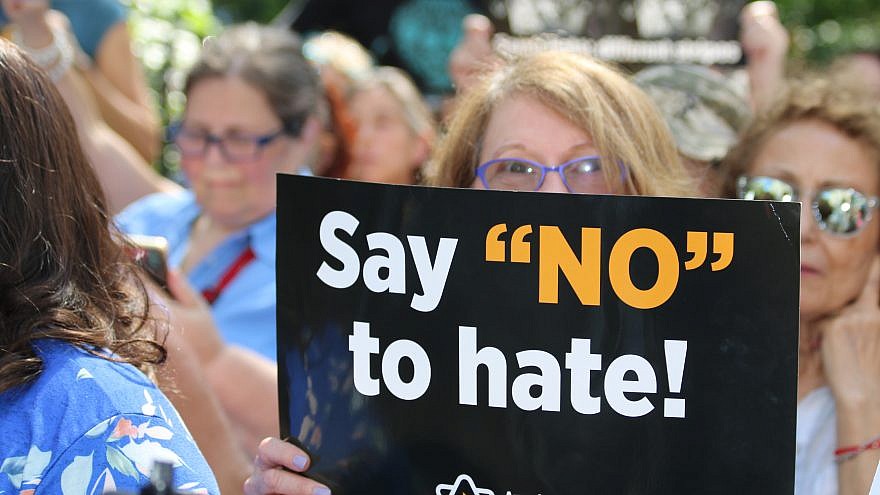As the Biden administration prepares to take on major international issues of the day, a debate has emerged within the American Jewish community over whether the International Holocaust Remembrance Alliance’s (IHRA) definition of anti-Semitism should be adopted into law.
A group of left-wing Jewish and Israeli groups issued a joint statement last week in opposition to adopting the definition, claiming that doing so would silence criticism of Israel.
The collection of groups—known as the Progressive Israel Network—include Ameinu, Americans for Peace Now, Habonim Dror North America, Hashomer Hatzair World Movement, Jewish Labor Committee, J Street, New Israel Fund, Partners for Progressive Israel, Reconstructing Judaism and T’ruah: The Rabbinic Call for Human Rights.
The Conference of Presidents of Major American Jewish Organizations pushed back against the Progressive Israel Network and expressed support for the IHRA definition.
Over the last several years, the IHRA’s definition on anti-Semitism has been adopted by countries and organizations across the world as the standard to help combat rising anti-Semitism.
However, the Progressive Israel Network stated that “as organizations that care deeply about the State of Israel and about the well-being of the Jewish people, we are deeply committed to the struggle against anti-Semitism. We are thus obligated to share our concerns about ways in which the effort to combat anti-Semitism is being misused and exploited to instead suppress legitimate free speech, criticism of Israeli government actions and advocacy for Palestinian rights.”
They continued, “In particular, the effort to enshrine in domestic law and institutional policy the International Holocaust Remembrance Alliance (IHRA) Working Definition of Anti-Semitism, with its accompanying ‘contemporary examples,’ risks wrongly equating what may be legitimate activities with anti-Semitism.”
The United States is one of more than 34 member countries of the IHRA. In December 2019, U.S. President Donald Trump signed an executive order on combating anti-Semitism that applied protections to Jews under Title VI of the Civil Rights Act of 1964 by requiring executive agencies to consider the IHRA definition in evaluating cases of discrimination against Jews. The executive order was signed especially amid the rise in anti-Semitism on college campuses.
The IHRA definition says: “Anti-Semitism is a certain perception of Jews, which may be expressed as hatred toward Jews. Rhetorical and physical manifestations of anti-Semitism are directed toward Jewish or non-Jewish individuals and/or their property, toward Jewish community institutions and religious facilities.”
“Combating anti-Semitism and ending the exploitation of universal human rights are vital ethical objectives, and are inherently bipartisan. In this context, NGO Monitor has called for governments, as well as NGOs, to adopt and apply the International Holocaust Remembrance Alliance (IHRA) working definition of anti-Semitism,” the organization’s president, Gerald Steinberg, told JNS. “We urge the incoming Biden administration to continue to lead this worldwide effort.”
‘No time to give cover to anti-Semites’
Yet for progressives, the definition has been accused of being used to suppress free speech, especially on college campuses.
The Progressive Israel Network says while members “respect the original creation of the IHRA Working Definition as an illustrative tool, and as part of a larger and ongoing conversation about the nature of anti-Semitism,” and “maintain no substantive objection to the core definition itself,” they expressed “concern with its adoption as a legal tool … with the IHRA definition’s ‘contemporary examples,’ which have been included as integral to the definition.”
The organizations warned that the adoption of the IHRA definition into “law or policy at the state, federal and university level, and in corporate governance, has the potential to undermine core freedoms, and in some cases, already has.”
Moreover, the groups called on Congress and the incoming Biden administration to “pursue a comprehensive strategy that takes on all forms of anti-Semitism and extremist hate, and which does not ignore the surging danger and violence of the white-nationalist, anti-Semitic far-right.”
In doing so, they “should reject facile, oversimplified doctrines that can easily be abused,” continued the groups. “They should refrain from legislating bans on constitutionally protected speech and legitimate activism, which often wrongfully target those who harbor no hatred towards Jews, and which make it more difficult to identify and confront genuine instances of anti-Semitism.”
Contrary to the Progressive Israel Network’s claims, the IHRA notes that “manifestations might include the targeting of the State of Israel, conceived as a Jewish collectivity. However, criticism of Israel similar to that leveled against any other country cannot be regarded as anti-Semitic.”
JNS has reached out to the Biden transition team to ask whether U.S. President-elect Joe Biden supports the IHRA definition.
In a statement, Democratic Majority for Israel president and CEO Mark Mellman said, “With anti-Semitic incidents rising at a shocking rate around the country and around the world, this is no time to give cover to anti-Semites who attempt to disguise their Jew-hatred as mere criticism of Israel.”
Mellman added that “Biden has long been a key ally in the fight against anti-Semitism and all forms of bigotry. We applaud him for vowing to make combatting rising anti-Semitism and white supremacy a major priority. Addressing anti-Semitism requires clarity about what it is. Adopting this internationally recognized definition government-wide will provide that clarity. We urge the Biden administration, and everyone who cares about the safety of Jews, to embrace it.”
On the other side of the aisle, the Republican Jewish Coalition said in a statement that “the IHRA working definition of anti-Semitism protects free speech while clearly delineating rhetoric and actions that are anti-Semitic.”
“Some fringe groups in the Jewish community oppose the IHRA definition; they are the same groups that support the BDS movement that seeks to delegitimize the State of Israel,” continued the RJC. “Groups that seek Israel’s destruction and attack Jews who support Israel are, in and of themselves, anti-Semitic. Their hate-mongering should have no place in American government policymaking.”


























